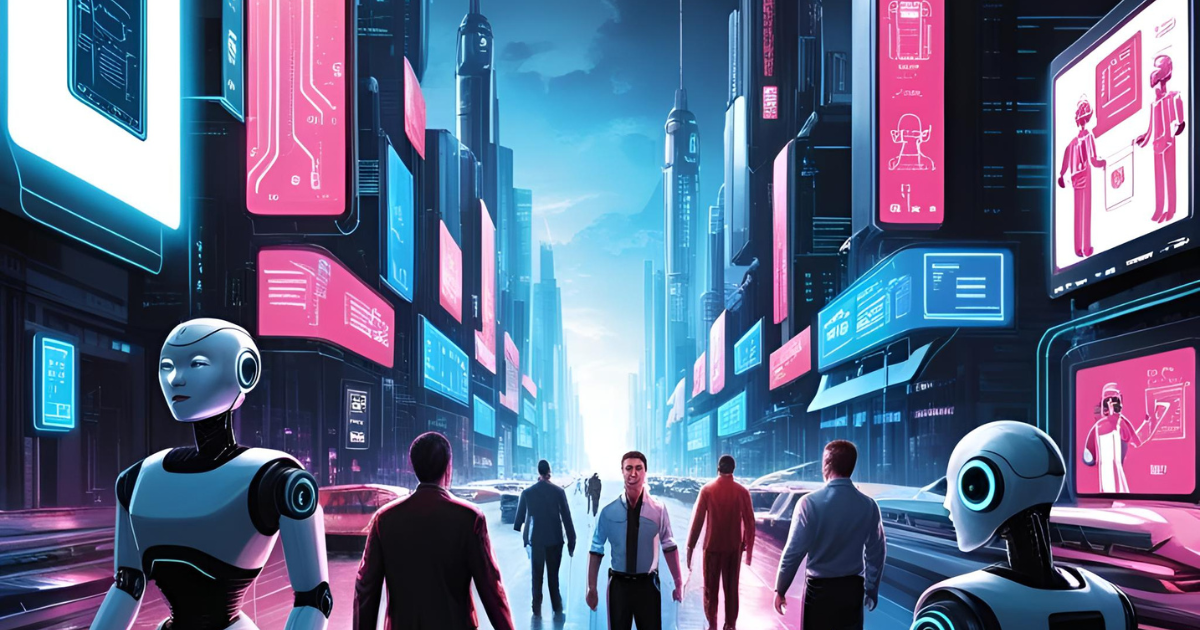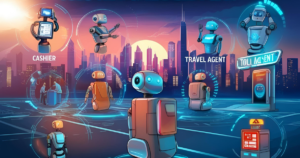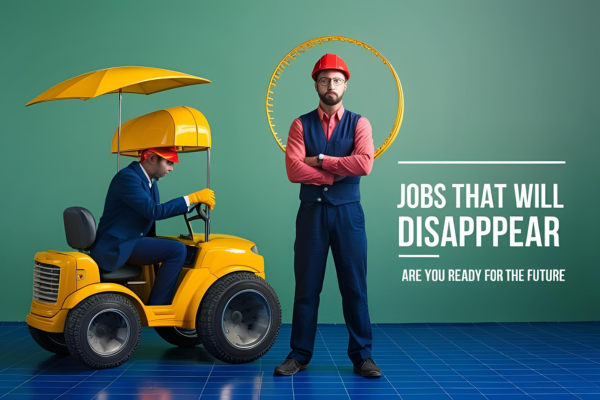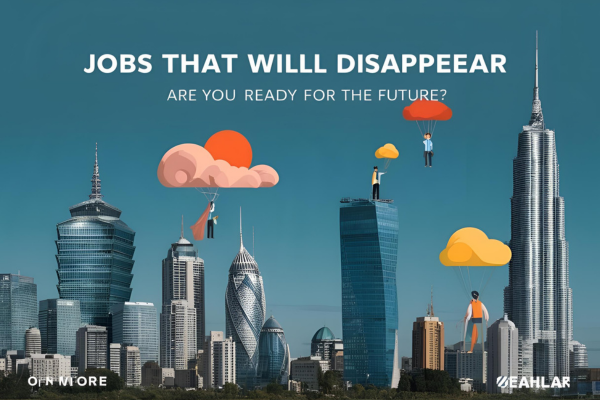Have you ever wondered if your job might vanish in the next few years? I’ve spent months researching this question, and what I discovered shocked me. The workplace revolution is happening faster than most of us realize. Let me take you through the amazing changes coming our way and how you can stay ahead of the curve You Will Know Jobs That Will Disappear.
What Is The Impact Of AI On Future Jobs?

I remember when my friend Sarah lost her data entry position last year. The company didn’t hire a replacement they installed new software instead. Her story isn’t unique. AI is reshaping our work landscape at lightning speed.
The numbers tell an incredible story. According to research from Oxford Economics, robots could replace up to 20 million manufacturing jobs worldwide by 2030. But here’s the surprising truth: this massive shift brings both challenges AND exciting opportunities.
While some jobs disappear, history shows us that technology creates MORE jobs than it eliminates. The key is understanding which careers are at risk and how to position yourself for success in this brave new world.
Why Certain Jobs Are More Vulnerable to AI Automation
Repetitive and Rule-Based Tasks Are Prime Targets
Jobs that follow the same steps over and over make perfect candidates for automation. Think about bank tellers processing deposits or factory workers performing the same assembly tasks thousands of times. Machines excel at consistency and never get bored!

My neighbor worked as a toll booth operator for 15 years before automated systems made his position unnecessary. The writing was on the wall any job with predictable patterns faces serious risk.
Jobs with Minimal Need for Emotional Intelligence
Have you noticed how many customer service calls now start with automated systems? AI struggles with emotional intelligence, but for roles where human connection isn’t central, the technology keeps improving at an astonishing pace.
When my cousin’s telemarketing position disappeared, she wasn’t surprised. “The scripts were so rigid anyway,” she told me. “We were already being treated like robots.”
Efficiency and Cost-Effectiveness Drive Automation
Businesses make decisions based on their bottom line. An AI system might cost $30,000 upfront but works 24/7 without breaks, benefits, or sick days. For many companies, the math makes automation irresistible.
I visited an amazing warehouse last month where robots now handle 80% of the sorting and packaging. The facility manager shared that their efficiency jumped by 65% while errors dropped dramatically.
The Role of Technology in Accelerating Job Displacement
The shocking truth is that technology improves exponentially. What seemed impossible five years ago is commonplace today. This acceleration means job displacement happens faster than workers can retrain.
You might remember when self-checkout lanes first appeared in stores. People thought customers wouldn’t accept them. Today, they’re everywhere, and the technology keeps getting better and easier to use.
Which Jobs Will Disappear By 2030?
Let’s explore specific careers facing extinction in the coming years. Some of these might surprise you!
Fast Food Workers
Next time you visit McDonald’s, count how many self-service kiosks you see. These touchscreens are just the beginning. Behind the scenes, companies like Miso Robotics have created Flippy, a robot that flips burgers perfectly every time.
I watched Flippy in action last year at a California restaurant. The robot never gets burned, never calls in sick, and delivers consistent results every time. While humans still manage the restaurants, their numbers are shrinking fast.
Telemarketers
AI-powered dialers already handle millions of calls daily. They analyze voice patterns, adjust their scripts based on your responses, and never get discouraged by rejection.
My friend in telemarketing admits his company now employs half the people they did three years ago. The remaining team members focus on complex cases the AI can’t handle yet.
Data Entry Workers
Data entry positions are vanishing at breathtaking speed. Advanced scanning technology and intelligent software can extract information from documents far faster than human workers.
When I toured a medical billing office recently, the manager pointed to empty desks where data entry clerks once sat. “Our new system processes insurance forms automatically,” she explained. “It’s 95% accurate and gets better every month.”
Assembly Technicians
Manufacturing has used robots for decades, but the latest generation of machines brings unprecedented flexibility. Modern robots learn new tasks quickly and work alongside humans safely.
During my visit to an electronics factory, I was amazed to see robots handling delicate circuit board assembly that once required human fingers. The precision was incredible.
Stockers at Warehouses
Amazon now employs over 200,000 robots in its fulfillment centers. These tireless machines bring shelves to human packers, dramatically reducing the need for workers to walk miles collecting items.
A warehouse manager told me their robotic system reduced their workforce needs by 30% while shipping more packages than ever before. “The robots handle the heavy lifting and repetitive tasks,” he explained. “Our people focus on problem-solving and quality control.”
Travel Agents
Remember when booking a vacation meant visiting a travel agency? Today, websites and apps let you compare prices, read reviews, and book your entire trip in minutes.
My aunt ran a travel agency for 20 years before closing shop. “The personalized service we offered couldn’t compete with the convenience and deals available online,” she shared. The few successful agents now specialize in luxury or adventure travel that requires expert knowledge.
Drivers
Self-driving technology improves every year. While fully autonomous vehicles aren’t mainstream yet, they’re coming faster than most people realize.
Trucking companies are investing billions in autonomous technology. With driver shortages and safety concerns, the economic pressure to automate is enormous. Taxi and delivery drivers face similar challenges as companies like Uber and Amazon test driverless vehicles.
Cashiers
Walk into any modern store and you’ll likely see self-checkout options. Amazon Go stores take this further you simply pick up items and walk out while cameras and sensors track your purchases.
I recently shopped at a completely cashier-less convenience store. The experience was smooth and quick no lines, no waiting. While some customers miss human interaction, younger shoppers especially embrace the speed and convenience.
Tax Preparers
Tax preparation software improves every year, handling increasingly complex situations. AI systems now recognize patterns from millions of tax returns, finding deductions human preparers might miss.
Last year, I used tax software instead of visiting my accountant. The program asked smart questions, imported my financial data automatically, and completed my return in under an hour.
Content Writers
AI writing tools have made astonishing progress. They can generate articles, product descriptions, and marketing copy with minimal human guidance.
While creativity and original thinking remain human strengths, routine content creation faces serious disruption. Sports recaps, financial summaries, and basic reporting increasingly come from AI systems.
Casino Dealers
Electronic tables already replace human dealers in many casinos. These systems never make mistakes counting chips or shuffling cards, while reducing labor costs dramatically.
During my Las Vegas trip last year, I noticed entire sections of electronic poker, blackjack, and roulette tables. Many players actually preferred them for their speed and lack of pressure to tip.
Translators
Remember when translation required years of language study? Today, AI systems translate documents, websites, and even live speech with remarkable accuracy.
My colleague recently held a business meeting with Japanese partners where everyone spoke their native language while earbuds provided instant translation. The technology wasn’t perfect, but it enabled communication that would have been impossible otherwise.
Toll Booth Operators
Automated toll collection systems have already eliminated thousands of jobs nationwide. E-ZPass and similar technologies let vehicles pass at full speed while automatically charging accounts.
The toll booth where I waited impatiently as a child has been replaced by an overhead scanner. Traffic flows smoothly now, with no need to stop or fumble for change.
Meter Readers
Smart utility meters transmit usage data directly to companies, eliminating the need for workers to visit homes and businesses.
My neighborhood installed smart water meters last year. We now track our consumption through an app that shows hourly usage and even alerts us to potential leaks.
Dispatchers
AI systems increasingly handle dispatch duties for taxis, delivery services, and emergency responders. These systems process more information faster than humans and optimize routes instantly.
A dispatcher friend told me her company now employs half as many people as five years ago. “The software handles routine calls, while we focus on emergencies and unusual situations,” she explained.
15 Jobs AI Will Likely Replace by 2030
While some overlap exists with our previous section, let’s look more deeply at 15 specific roles facing serious disruption:

Data Entry Clerks
Optical character recognition and intelligent document processing have advanced tremendously. Systems now extract information from handwritten forms, receipts, and unstructured documents with minimal human oversight.
I watched a banking system process 500 loan applications in an hour work that would have taken a team of clerks several days.
Telemarketers
Beyond basic calls, AI systems now handle complex phone trees and respond intelligently to customer questions. They analyze voice tone to detect frustration and transfer to humans when necessary.
The telemarketing calls I receive increasingly start with convincing AI voices that respond appropriately to my questions.
Receptionists
Virtual receptionists already answer phones, schedule appointments, and direct visitors in many offices. Physical robots are beginning to appear in hotel lobbies and corporate headquarters.
I recently checked into a hotel where a friendly robot greeted me, answered questions about amenities, and even escorted me to the elevator. The experience felt surprisingly natural.
Customer Service Representatives
Chatbots handle millions of customer inquiries daily, with capabilities growing exponentially. They access customer histories instantly and often resolve issues faster than human agents.
When my internet went down last month, I chatted with what I thought was a helpful agent. Only at the end did I realize I’d been talking to an AI system the entire time.
Bookkeeping Clerks
Accounting software increasingly automates data entry, categorization, and reconciliation. Machine learning systems flag unusual transactions and adapt to business patterns.
My small business bookkeeper now spends more time providing financial advice than entering numbers. The software handles routine transactions automatically.
Retail Cashiers
Beyond self-checkout, facial recognition and computer vision systems enable completely cashier-less shopping experiences. Your account is charged automatically as you leave the store.
I recently visited a convenience store where cameras tracked my selections and charged my account automatically. No scanning, no waiting just grab and go.
Truck and Taxi Drivers
Long-haul trucking routes on highways make perfect test cases for self-driving technology. Several companies already run autonomous trucks on interstate routes with human supervisors.
During a highway trip last summer, I drove alongside a semi-truck with a driver who wasn’t touching the wheel. The truck maintained perfect lane position and spacing from other vehicles.
Proofreaders
Grammar-checking software improves constantly, catching subtle errors and suggesting improvements that match specific style guides.
The writing tool I use identifies passive voice, redundant phrases, and readability issues that traditional spell-checkers missed entirely.
Manufacturing Workers
Advanced robots handle increasingly delicate and complex assembly tasks. Machine vision systems perform quality control inspections more consistently than human eyes.
I toured an automotive plant where robots installed windshields with precision humans couldn’t match. The error rate dropped by 80% after automation.
Delivery Drivers
Autonomous vehicles and drones are already delivering packages in test markets. These systems operate 24/7 regardless of weather conditions.
A small drone delivered my online purchase last week it landed precisely on my doorstep, confirmed delivery with a photo, and flew away. The entire process took seconds.
Security Guards
Surveillance systems with AI can monitor more areas more effectively than human guards. They never get distracted, tired, or miss suspicious activity.
The office building where my brother works replaced most security personnel with smart cameras that detect unauthorized access and unusual behavior.
Market Research Analysts
Data analytics platforms automatically collect, process, and visualize consumer information. They identify trends and correlations humans might miss.
A marketing friend explained how their new analytics system discovered customer patterns that led to a 40% increase in response rates insights they had overlooked for years.
Pharmacists
Automated systems already count pills and check for drug interactions more accurately than humans. Robotic pharmacies operate in some hospitals, filling prescriptions without errors.
The hospital pharmacy I visited uses robots to prepare medications, reducing wait times and virtually eliminating dangerous mistakes.
Legal Assistants
Document review software scans thousands of pages in hours, identifying relevant information and potential issues far faster than human readers.
A lawyer friend told me her firm now employs half as many paralegals. “The AI handles document review and basic research,” she explained. “Our assistants focus on client communication and complex tasks.”
Financial Analysts
Algorithmic trading systems analyze market data and execute trades in milliseconds. They process news, earnings reports, and economic indicators faster than any human analyst.
My investment advisor now relies heavily on AI-driven analysis. “The systems spot patterns across thousands of companies simultaneously,” he explained. “No human team could match that breadth.”
Why AI Can’t Replace All Jobs

Despite these dramatic changes, many jobs remain secure. Let’s explore why:
Human Emotions and Empathy: The AI Blindspot
Machines struggle with genuine emotional connection. Roles requiring deep empathy nurses, therapists, teachers, clergy remain distinctly human domains.
When my mother was hospitalized last year, the technical care was excellent, but it was the nurse’s compassionate presence that made the difference. Her ability to read subtle emotional cues and provide comfort can’t be programmed.
Creativity: The Final Frontier AI Can’t Cross
While AI can mimic creative works, true innovation the spark of something genuinely new remains elusive for machines. Artists, innovators, and visionaries bring perspectives shaped by uniquely human experiences.
I attended an art exhibition featuring both human and AI-created works. The technical skill in the AI pieces was impressive, but they lacked the emotional depth and personal statement of the human creations.
Complex Human Interactions: More Than Just Logic
Jobs requiring nuanced negotiation, leadership, and relationship-building resist automation. The subtleties of human interaction reading body language, building trust, inspiring teams remain beyond AI capabilities.
My sales director friend explains, “Our most successful people don’t just know the product they connect with customers personally. They sense unspoken concerns and adapt their approach accordingly. No AI can do that.”
AI’s Struggle With Unpredictable Scenarios
Machines excel in structured environments but struggle with the unexpected. Plumbers, emergency responders, and crisis managers face unique situations requiring judgment and adaptability.
When unusual storms flooded our neighborhood, restoration workers made countless on-the-spot decisions based on experience and intuition. Each home presented unique challenges no algorithm could have anticipated.
The Amazing Opportunities Ahead
While many jobs will disappear, the future isn’t gloomy it’s filled with incredible possibilities! Here’s what excites me:
New careers will emerge that we can’t even imagine today. Just as “app developer” or “social media manager” would have been meaningless terms 20 years ago, the next decade will create entirely new professional categories.
Humans will focus on what we do best creating, connecting, and caring. Routine tasks will be handled by technology, freeing us for more meaningful work.
The transition will be challenging but navigable with the right preparation. By developing adaptable skills and embracing lifelong learning, you can position yourself for success regardless of technological changes.
Your Action Plan For The Future
Here’s my practical advice for thriving in this changing landscape:
- Develop skills machines struggle with emotional intelligence, creative problem-solving, and adaptability will become increasingly valuable.
- Never stop learning. The most successful people will continuously update their knowledge and skills throughout their careers.
- Consider careers in healthcare, education, creative fields, and specialized trades. These areas will continue to require human touch and expertise.
- Embrace technology as a partner rather than fearing it as a replacement. The most successful workers will combine human strengths with technological tools.
- Build a personal brand based on your unique combination of skills and experiences. Specialization that crosses traditional boundaries often creates opportunities in emerging fields.
The future belongs to those who prepare for it. While many jobs will indeed disappear by 2030, countless exciting opportunities await those ready to embrace change!
What do you think about these workplace transformations? Are you concerned about your career, or do you see exciting possibilities ahead? I’d love to hear your thoughts in the comments below!
FAQ
Will AI completely eliminate human jobs?
No! While certain roles will disappear, history shows that technological revolutions create more jobs than they eliminate. The nature of work changes, but human workers remain essential.
Which industries are safest from automation?
Healthcare, education, creative arts, specialized trades, and roles requiring emotional intelligence face the least risk. Jobs combining technical knowledge with human touch offer particular security.
Should I be worried if my job appears on the “disappearing” list?
Being aware is important, but panic isn’t helpful. If your current role faces automation risk, start developing complementary skills now that will remain valuable as your industry evolves.
How can I prepare my children for this changing job market?
Focus on developing adaptability, emotional intelligence, and creative problem-solving. These foundational skills will serve them well regardless of technological changes.
Will universal basic income become necessary as jobs disappear?
This remains hotly debated. Some economists believe UBI will become essential as automation increases, while others expect new job categories to emerge as they have during previous technological revolutions.
Remember, throughout history, each major technological shift has ultimately created more prosperity and opportunity, even as certain jobs disappeared. With awareness and preparation, you can position yourself to thrive in this exciting future!

